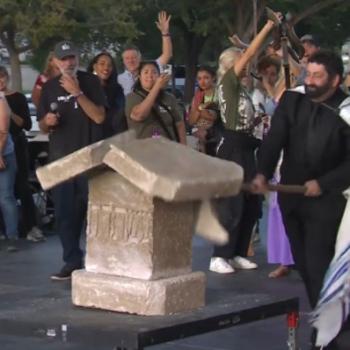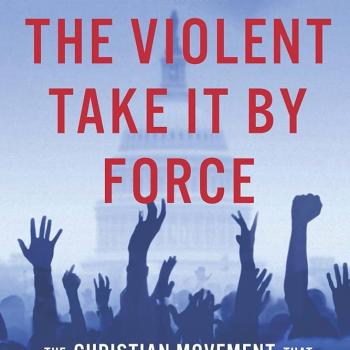Here, again, is Luke 15:25, the same verse we looked at in the previous post: “Now his elder son was in the field; and when he came and approached the house, he heard music and dancing.”
The older son in this story has been dutiful and scrupulously obedient. Until now. Now “he became angry and refused to go in,” because he considered all this music and dancing to be highly inappropriate. It was a celebration of wickedness and prodigality and of dissolute living of precisely the sort that the authoritative scriptures are very clear about condemning. And as a righteous, obedient person, the older son refuses to have anything to do with celebrating such behavior. And so he stands outside, apart from the celebration, refusing to join the dance.
In the story, he’s all alone out there, but he’s hardly alone in the white evangelical churches of America. Millions of good, obedient Christians are standing with him out there in the dark, angry and refusing to join the party.
Many others are out there, too, but they don’t share the older son’s anger. They can hear the music and dancing inside and they want to go in to join the party. They really wish they could. But they’re convinced they’re not allowed to.
They’re convinced the Bible says, unambiguously and emphatically, that they’re not allowed to. And they’re convinced that they must therefore obey whatever the Bible says, whether they like it or not. So while they may not be quite as angry, they still refuse to go in, remaining out there in the dark, furtively tapping one foot to the music occasionally and then feeling guilty about that.
You can hear a bit of that in J.R. Daniel Kirk’s voice when he writes: “As a New Testament professor, the greatest struggle I’ve had as I have wanted to be more affirming of my LGBTQ sisters, brothers, and others, has been the scriptural prohibitions.”
He heard the music and he wanted to join the party, but those “scriptural prohibitions” wouldn’t let him. I’ve heard that same frustrated, constrained longing to dance in many other voices over the years. That’s why it’s never a complete surprise when some of those folks — Steve Chalke, Tony Campolo,* Dave Gushee — eventually leave the older brother’s side and join the music and the dancing.
Ultimately, for Kirk, the music — like the Holy Spirit — proved irresistible. And so he has finally joined the party.
Happily, Dr. Kirk didn’t choose to do this by releasing some kind of “statement” announcing a formal shift away from his previous “stance” on the “issue.” He has done it, instead, by telling his story and the way that nothing less than the gospel has compelled him to follow that story.
This didn’t happen because he decided to start ignoring the clobber-texts he describes as “scriptural prohibitions.” It happened because he allowed the explosive good news of the gospel to upend the idea that the Bible is something we should think of as an almanac of prohibitions.
You can read through his attempt to describe that explosive, liberating transformation in this series of recent posts:
2. “Scripture and the Spirit of Christ“
3. “Gentiles? Really?“
Kirk isn’t nibbling around the edges of the clobber-texts in the hopes that we can somehow exegete our way from injustice to justice. He’s making a thoughtful, persuasive, and deeply biblical case that “the Spirit, Jesus, and Paul” all compel us to choose “the path of faith which refuses to separate what God has joined together in the body of Christ.”
If you read through those posts, the broad outlines of his argument may seem a bit familiar. It’s the same argument from the trajectory of Acts and Galatians — the argument of Luke and of Paul, the writers of most of the New Testament — that I’ve been less elegantly presenting here. Kirk articulates that argument with more theological depth than I’ve been able to, and fortifies it with ecclesiological considerations and a deeper scholarly insight into those startlingly radical biblical themes. This is good stuff.**
This has, predictably, mortified many of the guardians of the scriptural prohibitions. Kirk has been “farewelled” by many tribal gatekeepers, while other “saddened” and “concerned” figures have criticized him and attempted to recenter the discussion back around their beloved clobber-texts. Robert Gagnon — the prolific anti-gay professor who routinely churns out 30,000-word screeds condemning wobbly white evangelicals for not accepting his authoritative interpretation of the word arsenokoites — even challenged him to a formal debate.
But the joyous, delightful thing to behold here is that none of this condemnation or pious lamentation seems to touch him. Kirk doesn’t so much agree to a formal debate with Gagnon that he attempts to “win” as he accepts the invitation as a chance to share the exciting good news that he has found. He’ll stop by to chat, but he can’t stay long because he has a party to get to.
We all do.
There’s a party going on just over there. They’ve got music and dancing and fatted-calf with bacon. It’s divine. It’s heavenly.
And stop worrying — you’re allowed to join. So stop standing around out there in the dark with that angry older brother. Quench not the spirit. Come in, come in. Get ready to dance.
– – – – – – – – – – – –
* The only surprise to me was that it took Tony Campolo so long to do it — his wife has been inside, dancing her heart out, for decades. But Tony didn’t officially announce his change of heart toward his LGBT brothers and sisters in Christ until he was 80 years old. Coincidentally, that same age — 80 — is how old mega-church pastor Rick Warren will be when he eventually makes that same announcement a couple of decades from now.
** That’s not to say I’m in 100-percent agreement with all that Kirk has to say in those posts. But the dance has only just begun, and I look at where he started and where he has arrived and how he got there, and I want to celebrate that.
















